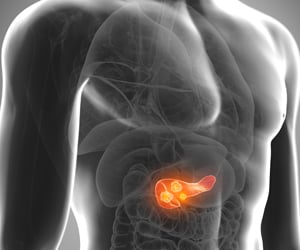Pancreatic cancers are resistant to chemotherapy; however, a new research has identified that targeting glutamine metabolism enhances the efficacy of chemotherapeutic drugs to treat the disease.
Highlights:
- A way to utilize existing chemotherapy in a more efficient manner in treating pancreatic cancer has been discovered
- Scientists have identified a novel therapeutic strategy by targeting glutamine metabolism as a biological target for the disease
- Targeted inhibition of glutamine metabolism pathway could be used as a distinctive therapeutic opportunity with chemotherapy for treating pancreatic cancer- opening up a new therapeutic route for combating chemo-resistance
Read More..
The findings are published in the journal Cancer Research, a journal of the American Association for Cancer Research.
About Pancreatic Cancer
Current therapeutic options for pancreatic cancer are limited. Many pancreatic tumors resist chemotherapies, which poses a significant clinical challenge for doctors and patients and contributes to a high rate of recurrence. Mutated KRAS is a critical driver of pancreatic cancer, and studies have linked it to altered metabolism in pancreatic tumor cells. Tumors harboring these oncogenic mutations remain among the most difficult to treat, so there is an urgent need for effective therapies.Research to Overcome Resistance of Pancreatic Cancers
The team tested the combination therapy in mice by using glutaminase inhibitors alongside gemcitabine, a first-line chemotherapy. The results were encouraging: the treated mice lived longer and had less tumor burdens than controls, supporting the idea that glutamine inhibition improves the effectiveness of chemotherapy.Dr. Suman Mukhopadhyay, the postdoctoral research fellow at the RAS Initiative and first author of the study, believes further research is warranted to determine if this represents a therapeutic intervention for the significant percentage of pancreatic cancer patients harboring KRAS mutations that have, to date, been resistant to current therapies.
Additionally, it will be worthwhile in future studies to evaluate whether the findings from this work have implications for cancers with similar KRAS mutations.
Reference:
- Undermining glutaminolysis bolsters chemotherapy while NRF2 promotes chemoresistance in KRAS-driven pancreatic cancers - (https://cancerres.aacrjournals.org/content/early/2020/01/09/0008-5472.CAN-19-1363)
















